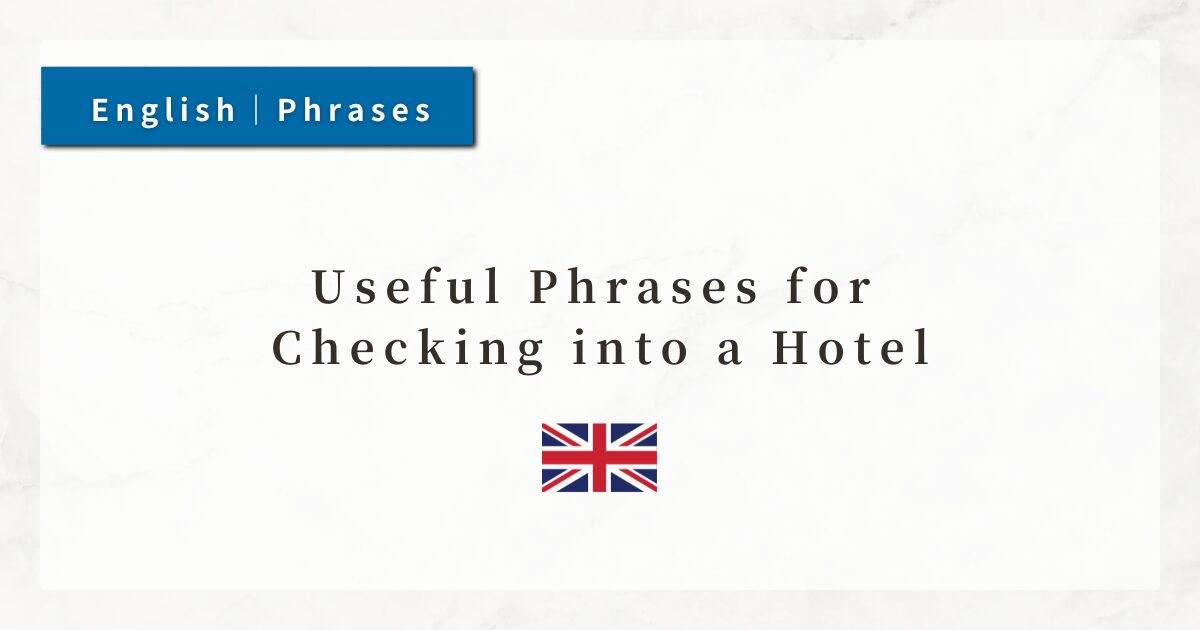#12 Useful Phrases for Checking into a Hotel|English for Travel Accommodation

One of the first places I visit when I arrive on an overseas trip is the hotel front desk. If I can check in smoothly, I can start my journey with peace of mind.
During check-in, I need to provide information such as my name, whether I have a reservation, the length of my stay, and the method of payment. Many people feel nervous about using English in this situation, but as long as I remember the basic phrases, there is no problem.
In this lesson, I will introduce practical English expressions that I can use when checking in at a hotel and explain the grammar and usage points behind them.
Dialogue

Good evening. How can I help you?

Hi. I have a reservation under the name of Yamada.

Let me check… Yes, we have your reservation. May I see your passport, please?

Sure. Here you are.

Thank you. You’ll be staying for three nights, correct?

Yes, that’s right.

Great. Your room is 305. Here is your key card.

Thank you.
1. Telling the Staff You Have a Reservation
When arriving at the hotel, the first thing to mention is whether you have a reservation.
- I have a reservation under the name of Yamada.
To specify the name under which the reservation was made, use:
- It’s under the name of Yamada.
- It’s under Yamada.
2. Requesting Identification
It is standard practice for hotels to request a form of identification, such as a passport, at check-in. The staff will often use:
- May I see your passport?
The key phrase here is “May I ~?,” which politely asks for permission or makes a formal request.
- May I take your order?
- May I have your name, please?
Compared with “Can I ~?,” the expression “May I ~?” is more formal.
3. Handing Something Over
When passing your passport or handing something to someone, use: Here you are.
- Here you are.
This phrase conveys the nuance of “offering something prepared for the other person.”
- Here it is.
→ used to point out something visible. - There you go.
→ more casual, often among friends.
4. Confirming Stay Details
When the staff confirms reservation details, they may say:
- You’ll be staying for three nights, correct?
The phrase “You will be staying” uses the future continuous tense to describe a planned arrangement.
The tag “correct?” adds a polite confirmation, equivalent to “Is that correct?”
- correct? (formal)
- right? (casual)
- Is that correct? (polite and complete)
5. Handing Over the Key Card
When giving a key card or room key, the staff may say: “Here is your key card.”
- Here is your key card.
This structure “Here is ~” is a set phrase used when presenting something formally.
- Here is your receipt.
- Here is your room number.
Summary
- I have a reservation.
→ Used to indicate you have a booking. - Under the name of ~
→ Standard phrase to provide the reservation name. - May I see your passport?
→ Polite request for identification. - Here you are.
→ Natural response when handing something over. - You’ll be staying for ~ nights, correct?
→ Formal phrase to confirm details. - Here is your key card.
→ Polite expression when handing over a key or item.






